Vital FAQs Answered About Patara Elephant Farm in Chiang Mai
Patara Elephant Farm may be on your mind. You've been inspired by countless Pinterest photos of Thailand: its beautiful beaches, impressive temples and adventurous excursions.
You've decided to go to this amazing location and already booked your flights. Next thing on your list is figuring out exactly what you're going to do. You ask yourself, “What would a trip to this unique country be if we didn't have an experience with ELEPHANTS?”
There are two popular elephant experiences in Thailand, one being Patara Elephant Farm and the other Elephant Nature Park. We went to Patara and have valuable insight for you – and our conclusion is not what you think.
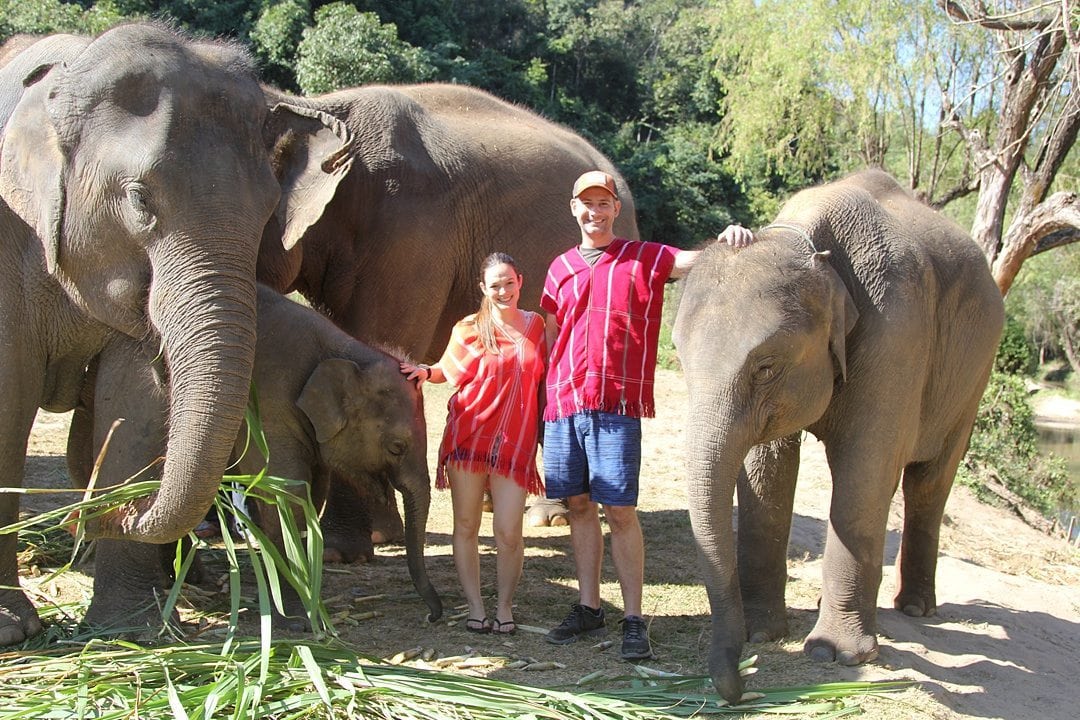
Why Book Patara Elephant Farm Chiang Mai?
We were discussing our upcoming trip to Thailand with our friends while were were in San Diego. One of our two friends immediately asked if we were doing an experience with elephants. It hadn't really crossed our minds. She asked, “Did you book one yet? They fill up QUICKLY!” I put a reminder in my calendar to look up information that evening after a slight panic we already were too late.
She mentioned I should looked into companies that treat elephants PROPERLY and are working to protect the animals, not exploit or abuse them. Of course we only want the best treatment of animals as animal lovers; I was happy to read about her experience at Elephant Nature Park on her blog.
Patara says they are 100% Thai Owned and Dedicated to the Conservation of the Species.
Patara's email signature notes the following nine facts about their company to consider when booking:
- They adopt/rescue elephants from living conditions such as circuses and illegal logging camps.
- They focus seriously on health recovery for elephants and natural breeding management to increase the elephant population. (Nearly half of the elephant population disappeared in the last 40 years, which is half of a generation.)
- Seventeen of their elephants were born in the last nine years and most of their female elephant are now pregnant. (Seven babies were born between 2011-2012.)
- They've been operating for ten years with no deaths on record because of their healthcare program and daily elephant activities.
- Eight of their elephants were set free into a natural habitat and they are all doing well. (elephantreintroduction.
org ) - They provide more open land for elephants than any other place. (Highest area per elephant population.)
- They are the only elephant sanctuary in Asia that has less visitors everyday than their elephant population number.
- They provide upscale interaction with elephants in terms of quality and flexibility in length of time for their guests.
- Their program is well established and 100% self-created while many other elephant companies recently opened and try to imitate them.
What is the main difference between Patara Elephant Farm and Elephant Nature Park?
I've only experienced Patara first-hand but it seems the main difference in experience is you can ride the elephants in Patara (bare back, with a rope comfortably tied around them as a handle) and you cannot ride them with ENP. I am sure there are other differences but this is the most notable that comes to mind that affects and impacts your visit.
Our Discomfort with Our Visit: Is Patara Elephant Farm Ethical?
***After this post's original publication date I became skeptical about Patara's treatment of the elephants and elephant farm abuse, strictly due to two things:
- I saw many articles always pointing out how ENP is the park working towards elephant conservation in Thailand. I don't know if this is because Patara Chiang Mai isn't, or simply because they don't get as much publicity. Without going back to Thailand and doing extensive research on the subject, which we aren't funded to do, I can simply post to educate you. This is the information we have about our experience at Patara.
- We don't know why you're allowed to ride they elephants at Patara. I imagine the elephants don't like it and it's unnatural for them. I just felt very odd riding them. Something felt off like we shouldn't be doing it and I'm usually very tuned into energy.
If we were to go back to Thailand, or speak to anyone who is going, we recommend (and would personally visit if we had to do it again) Elephant Nature Park or ENP.
Why is this article still up if I disagree with Patara Elephant Farm allowing guests to ride elephants?
I am leaving this article up because there are a lot of elephants in danger of losing their lives in Thailand because of horrific treatment from far, far, far worse owners.
You see them on the side of the road in some areas, literally chained to posts like dogs on leashes. And we do believe Patara is saving elephants from far worse conditions.
We also realize tourists are going to visit Patara regardless and find our article through searching. We know this article can provide education about elephant farms and visiting as well as make readers aware of ENP as an option.***
Hopefully Patara will consider this if they see our article and it will play a small part in not permitting visitors to ride the elephants one day.
How Much Does a Day with an Elephant at Patara Cost?
The cost per person to be an “Elephant Owner for a Day” was 5,800 Thai baht as of winter 2016. This is equal to approximately $175-$200 USD per person, depending on current conversion rates.
It includes: specialized training trip with your own elephant, transportation to/from the hotel to the farm, a traditional Thai picnic lunch, drinking water and a complimentary DVD with photos from the day. They function on the honor system – no monetary deposit was required of us to book a reservation.
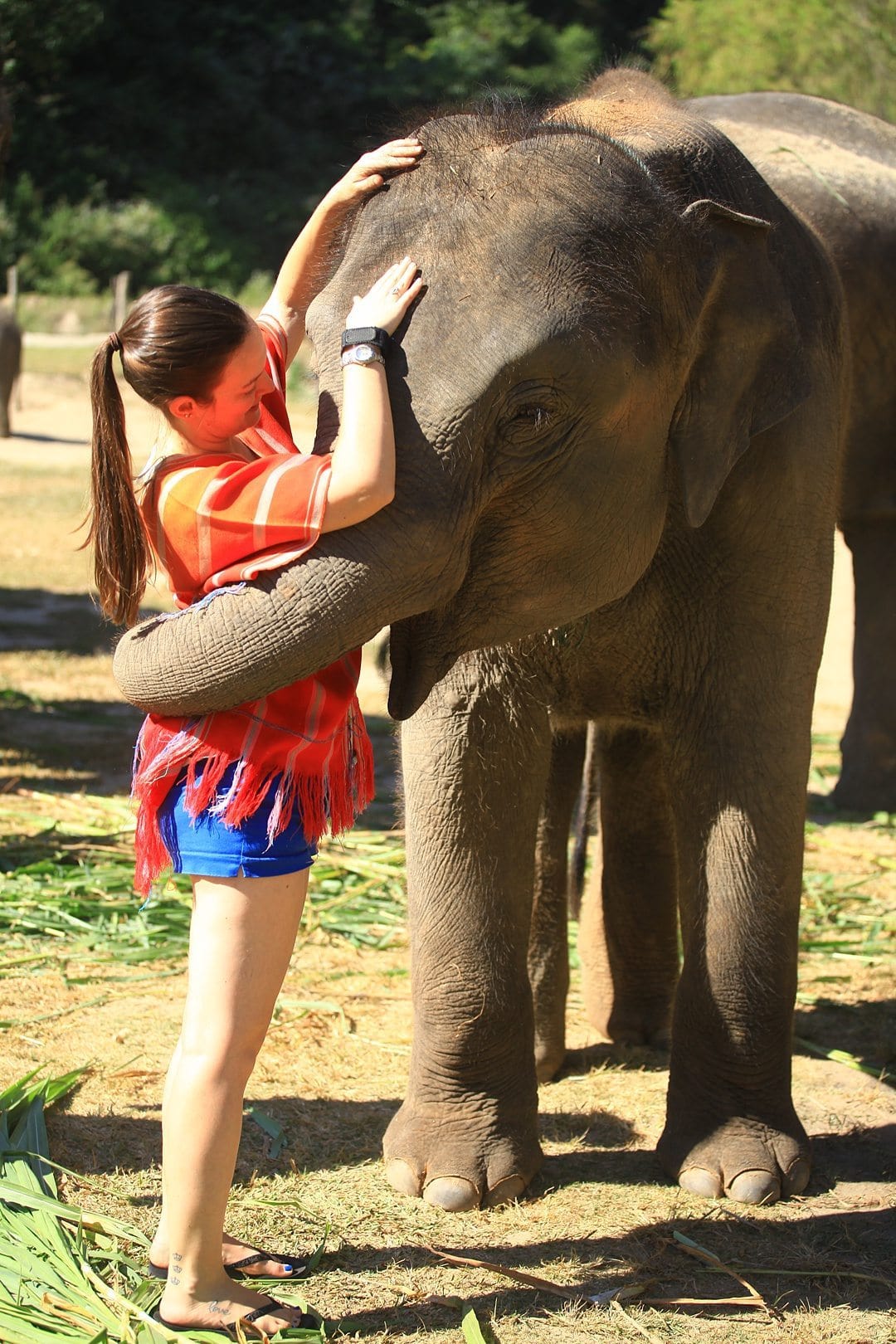
How to Make a Reservation
Patara can be reached via email to reserve a space. You may not hear back immediately. I even bought credits on Skype to call all three phone numbers they have listed on their website and I had no success with any. No one answered. I emailed again and again.
It felt like weeks went by before I received a confirmation email reply that we were booked even though I probably had to only wait a few days. I'm incredibly responsive on email and text messages so, naturally, I found it very frustrating a seemingly modern company with a relatively great website would be unresponsive.
I realized why as soon as I stepped foot on their ground! They're virtually in the middle of nowhere doing business from cell phones circa 2005. I do believe they will get back to anyone and everyone – this is how they make money and support their elephants after all. It just may take a long time because they are working with minimal resources.
How to Get to the Farm
You are asked to confirm your reservation and the hotel you're staying at via email or phone once you arrive to Chiang Mai. We were promptly picked up the day of our reservation at 7:30am by a man wearing a clearly marked “Patara” t-shirt. The drive to the site was about two hours.
Are There Toilets at the Farm?
Yes! There were two toilets there. Whew!
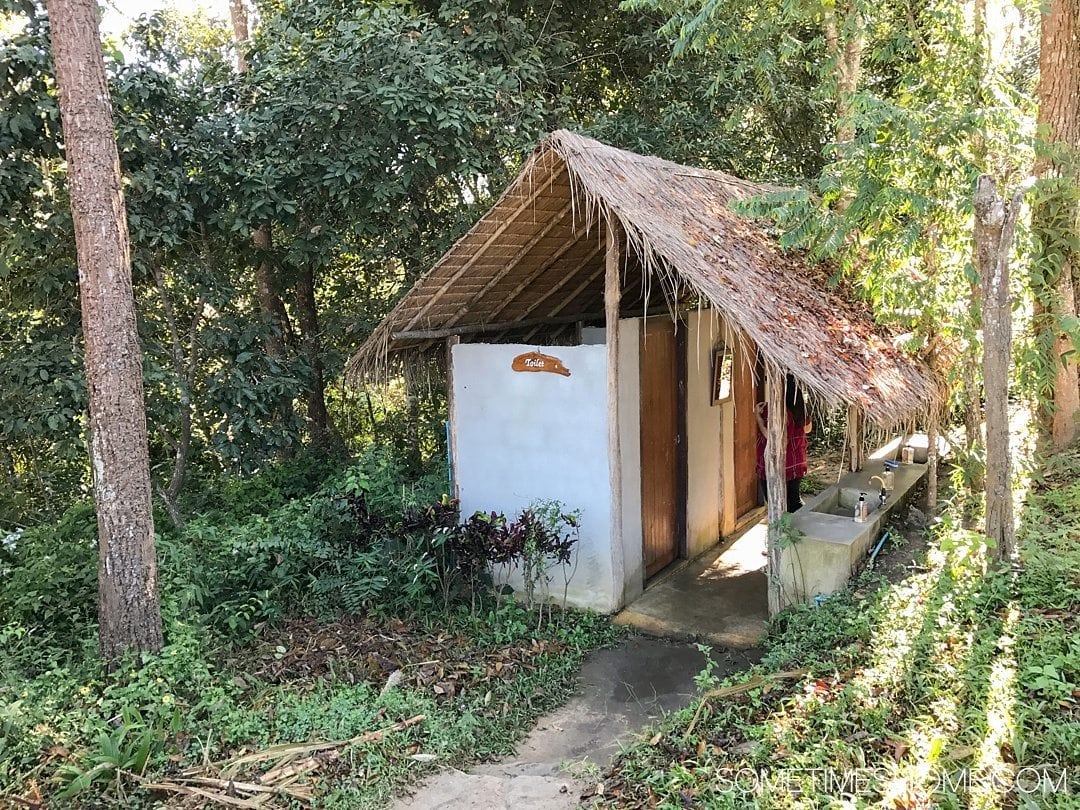
What to Expect Upon Arrival
We finally reached our destination after a long drive. It was worth the wait! We were welcomed by three elephants. The eldest was a grandmother around 45 years old, her daughter who was also a mother, and her baby, Hana, who was about one year old.
They were eating sugar cane and bananas and we were told it was okay to hand feed them. It was my first “petting” of an elephant as well; I was surprised at how rough and course their skin and hairs are.
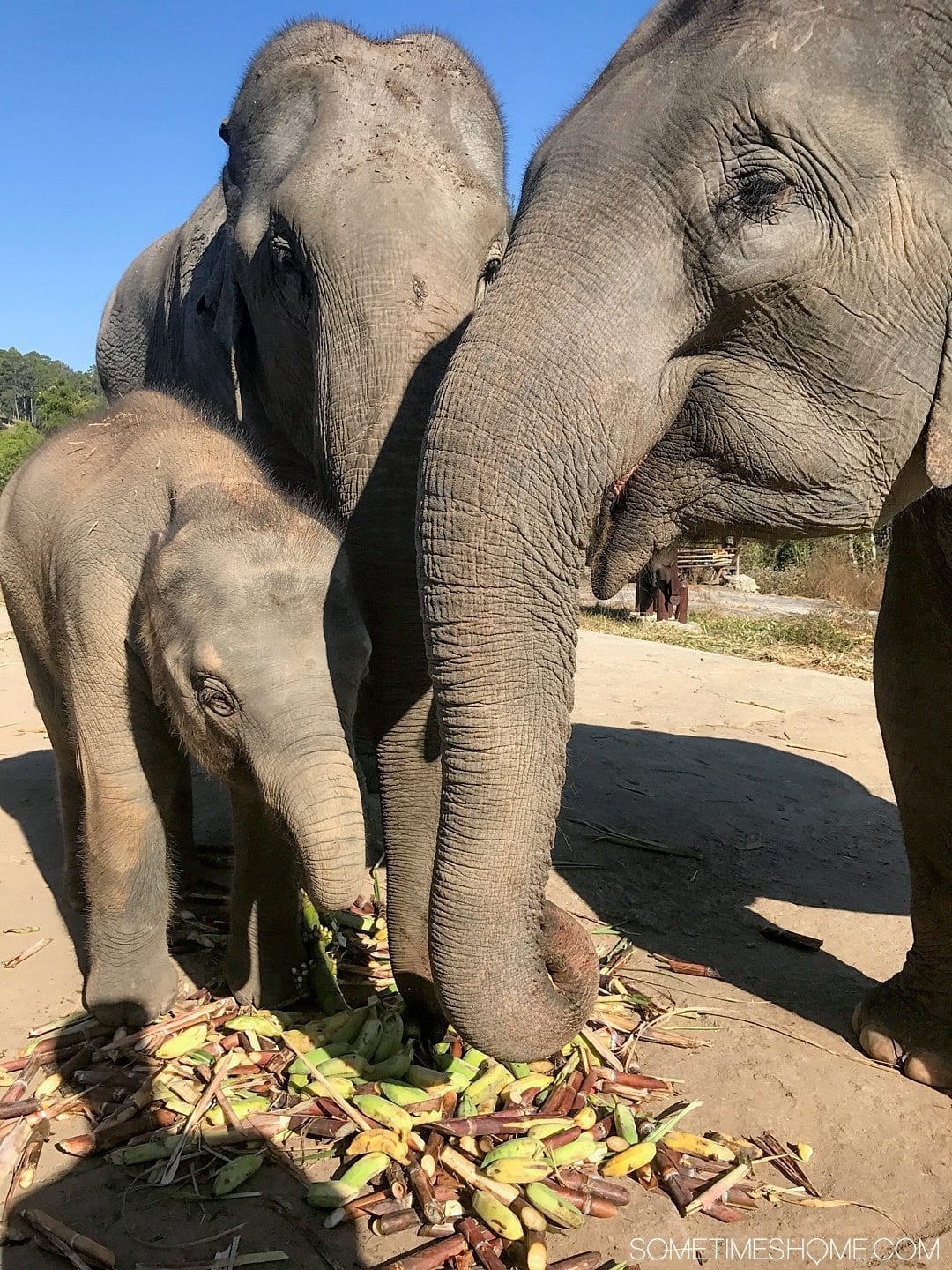
After about ten to fifteen minutes of interacting with them, the group was led to a gazebo. We were eight total, including two couples and a family of four. Our main guide, whose English was fair and definitely sufficient to understand him throughout the day, had us sign paperwork and add to our outfits.
We each chose a color shirt and pants to put on over our clothes. We were informed it was because it's softer on the elephants and they recognize the clothing day after day. (Don't worry about the color you get – you don't get to keep it anyway.) We were even given Patara branded water bottles.
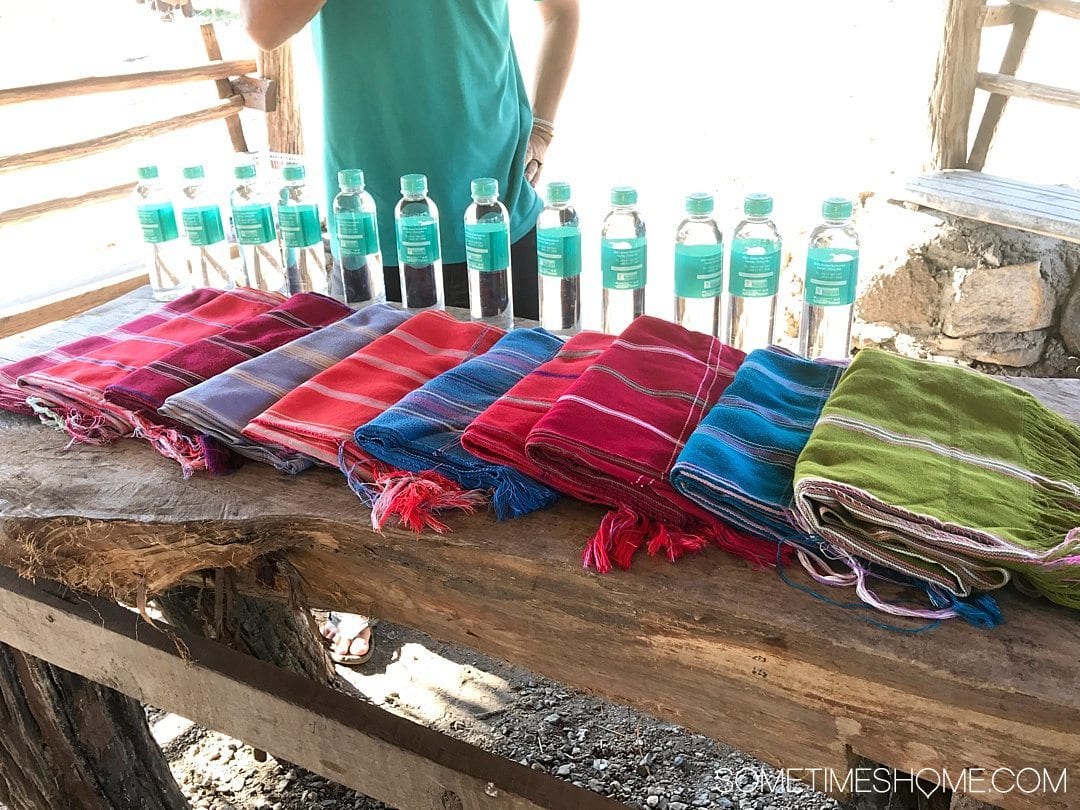
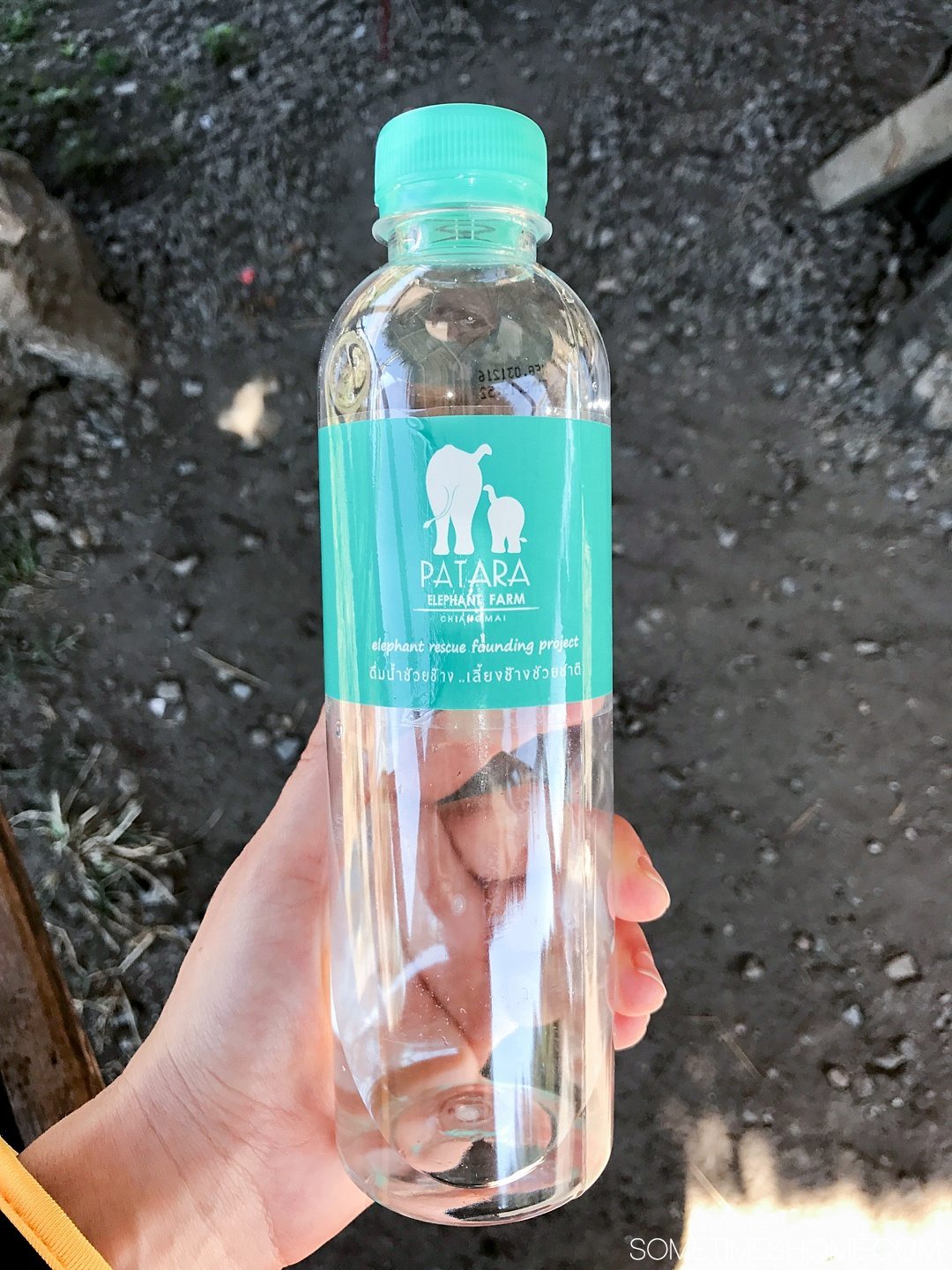
What Next?
We were led on a ten minute walk through the natural landscape after signing paperwork and hydrating, to a place where many elephants were standing. I suppose this was the closest feeling to a “farm” the property gave me all day.
The walk was beautiful and at about 10:00am the sunlight hitting the plants was a photographer's dream.
I opted to leave my camera at the hotel because I knew we'd be getting wet that day, simply wanting to enjoy moments as they happened without worrying about my professional equipment. However, I was sure to bring my iPhone camera and GoPro that the trainers were generous enough to help me use throughout the day.
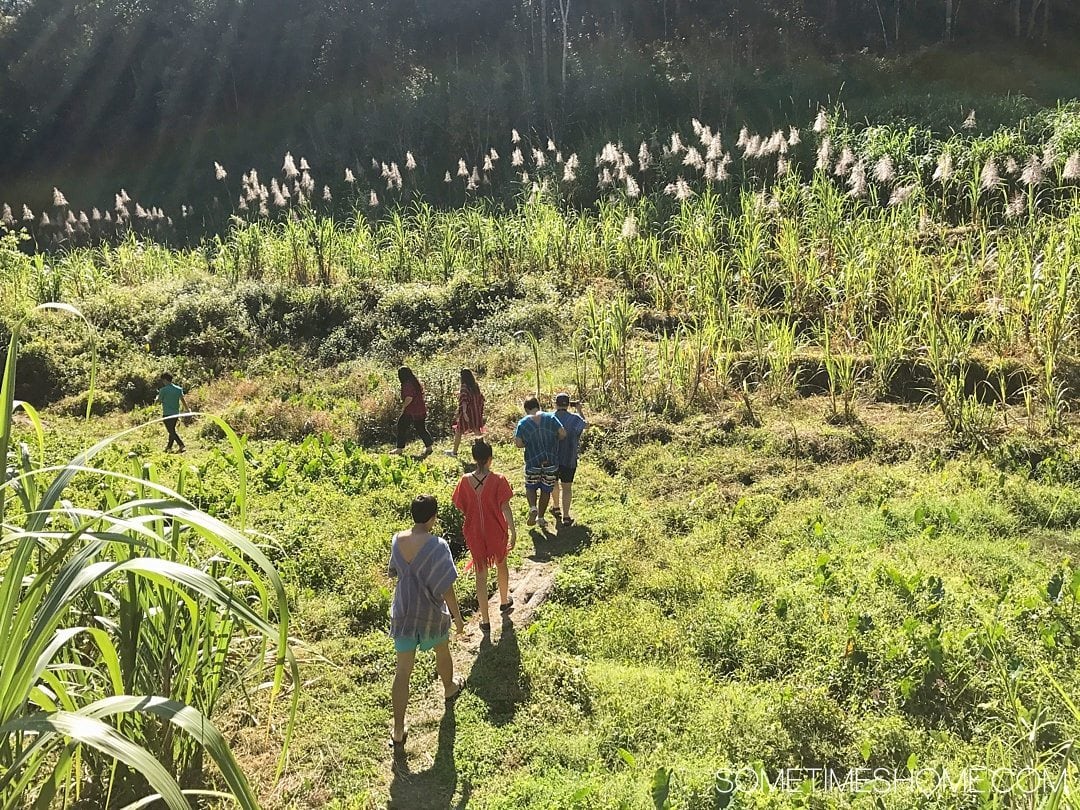
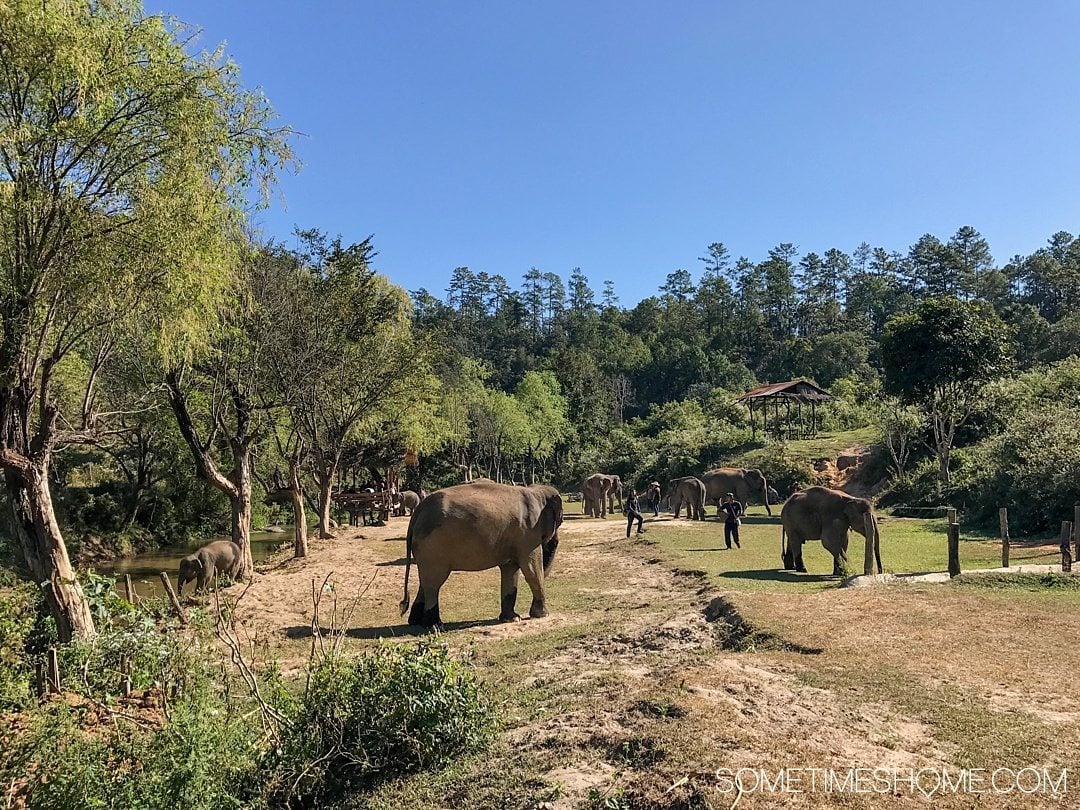
We were each assigned our own elephant. My elephant was Noon, a male who was six years old. He didn't have tusks and we learned about 1% of elephants don't have them at all.
Dan was assigned a 25 year old female named Sumsee who had been at Patara for two years. They told me I was assigned Noon because he has the best personality but I suspect it was also because he was a bit shorter of an elephant while Dan's was much taller. I'm 5'1″ and Dan's 6'2″ so that made sense!
Luckily, you are not solo with your elephant. Each elephant has a trainer who knows his or her personality better than the day's guests could ever guess in such a short amount of time.
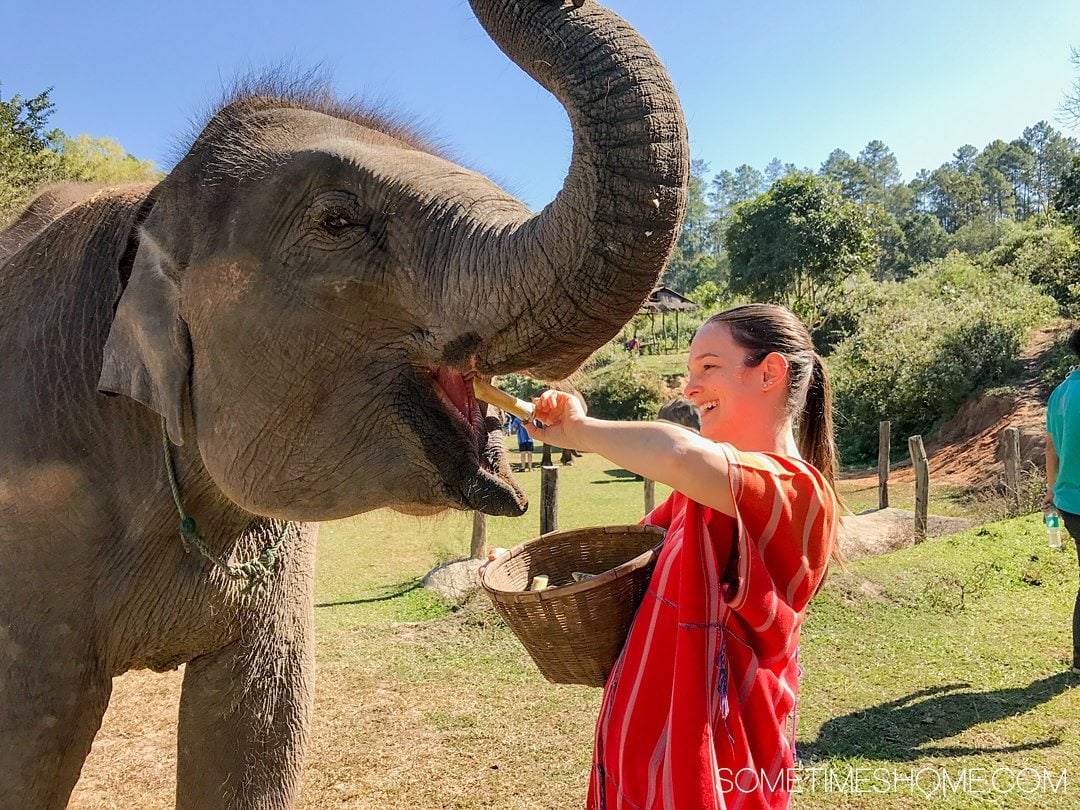
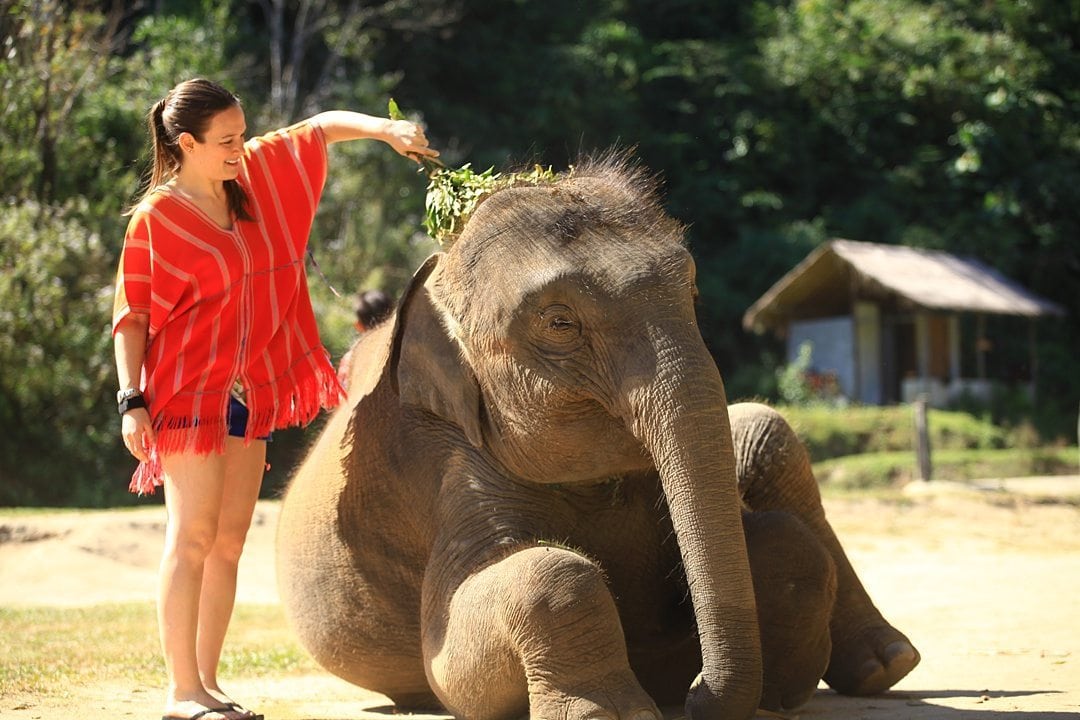
What to Expect the Rest of the Day
Feeding the Elephants and Cleaning Them
We fed them a little food from a basket they provided for each participant (elephants eat all day long) then cleaned them. Elephants are fairly dirty so we assisted by brushing them with a short broom of leaves then leading them to the river to splash water on their backs.
We learned some trainer commands including how to get them to lift their trunks and open their mouths. We also received a little tutorial on how to get on top of the elephant. (It's a combination of stepping from his or her foot, to leg, then hoisting yourself over atop the animal.
Read more later on where I mention I hope they stop allowing visitors to do this. In hindsight I should have not done it.) Whereas a dog wags his tail to show happiness elephants flap their ears. Their ears were aflutter in the water; they seemed to really enjoy the river.
Riding the Elephants (Which I did NOT Like and Don't Recommend)
Here's the part I didn't like: We rode our elephants twice that day, once on a walk through the river and once again before we left on solid dry ground.
You put on the pants they give you just before you ride your elephant, which is mutually beneficial to you and the elephant. One by one we mounted our elephants and walked with them and our trainers through the river and natural brush, back towards the area we first arrived in. We learned how to steer the animal – gently pushing our right leg on his or her ear to go left or push our left leg on his or her left ear to go right. I felt uncomfortable the entire time, like I shouldn't even be on the elephant.
The day was flying by and it was time for lunch. We changed into our swimsuits in the bathrooms after lunch and played in the river with the elephants.
What About the End of the Experience?
The end of the day brought about one last ride with our personal elephant.
At the closing of the experience you say goodbye to your elephant and trainer, pay the entire 5,800 baht per person balance to the main guide in cash, tip your trainer, and take your DVD of photos before you get on the van to head back to the main city area of Chiang Mai.
You are dropped off at the hotel you were picked up at that morning.
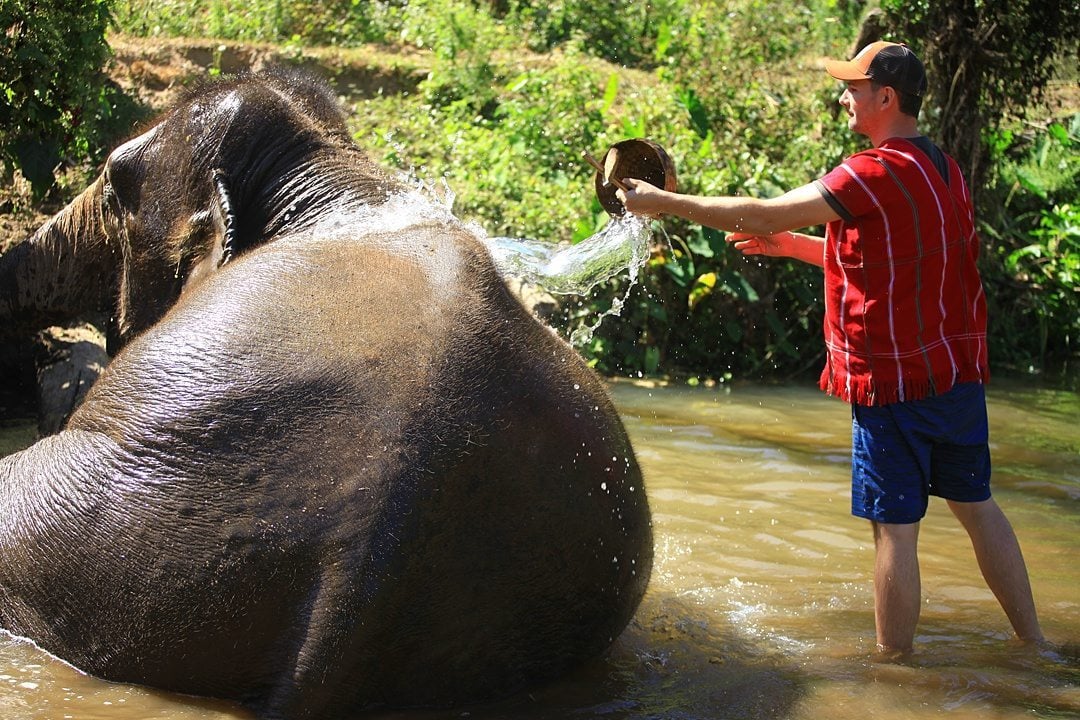
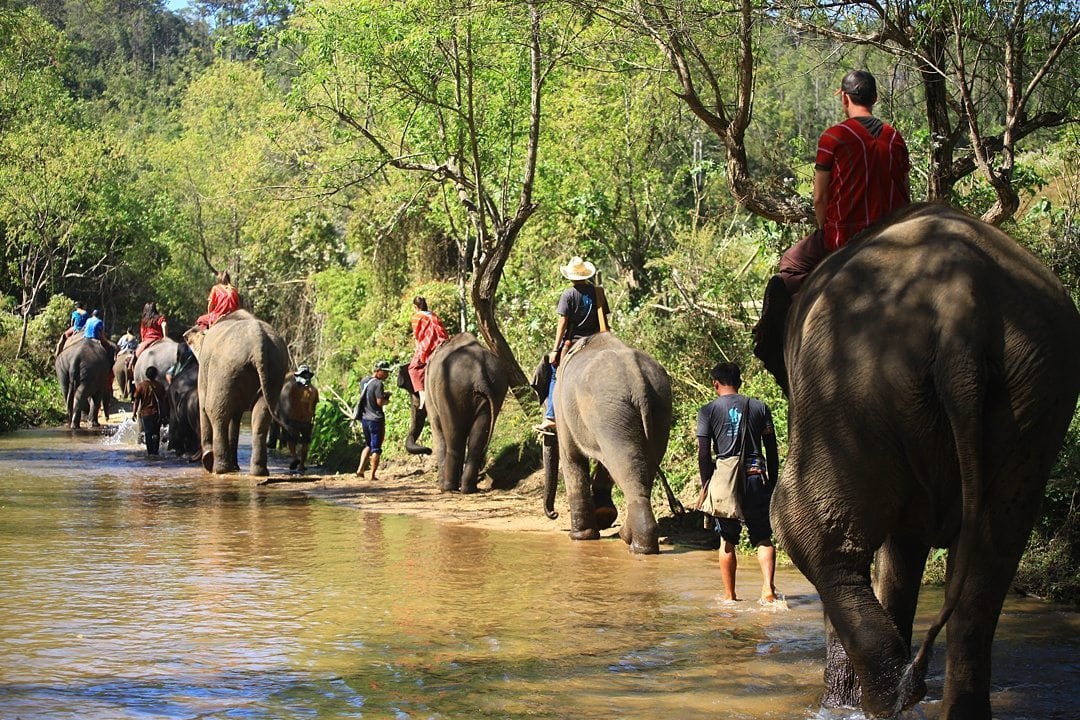
Should We Bring Food?
I was very impressed with the lunch they provided so unless you have a severe dietary restriction there's no need to bring your own.
Lunch was clearly prepared with love and care by either a family member or friends of whoever runs the company. It included fruits of all kind, including bananas, oranges and jackfruit, sticky rice and chicken wings. Even the presentation was beautiful!
They provide water as well; I was surprised to see it was even branded with the Patara logo.
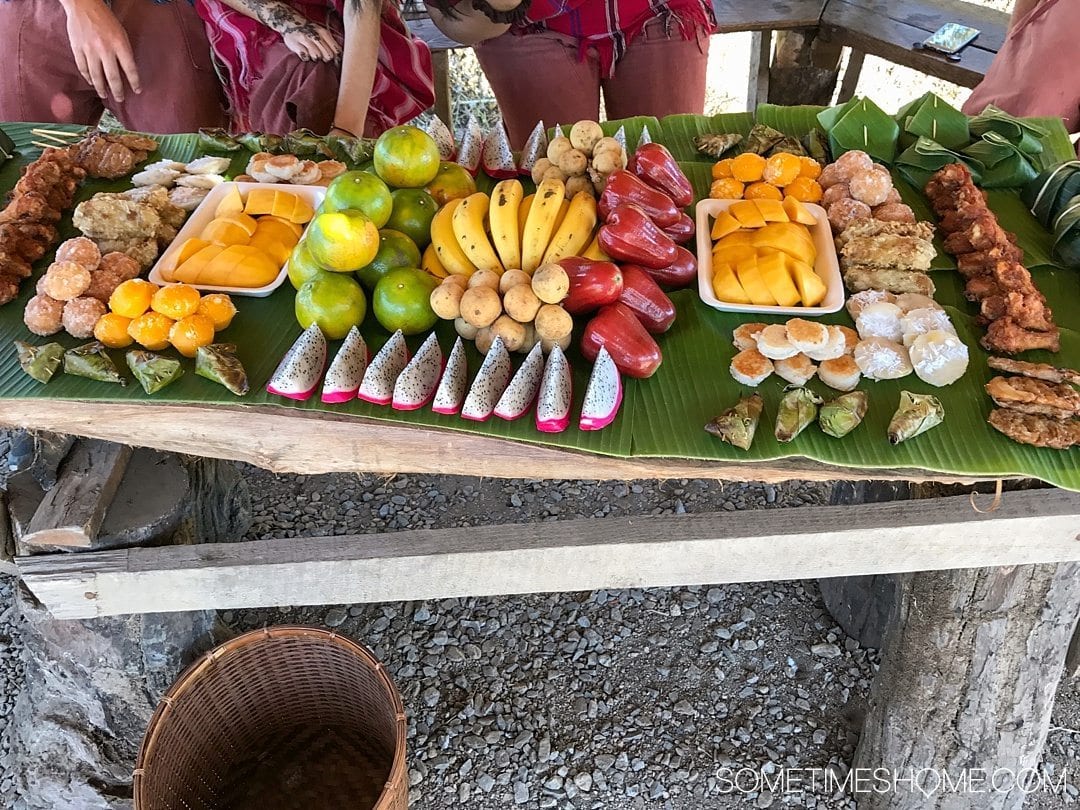
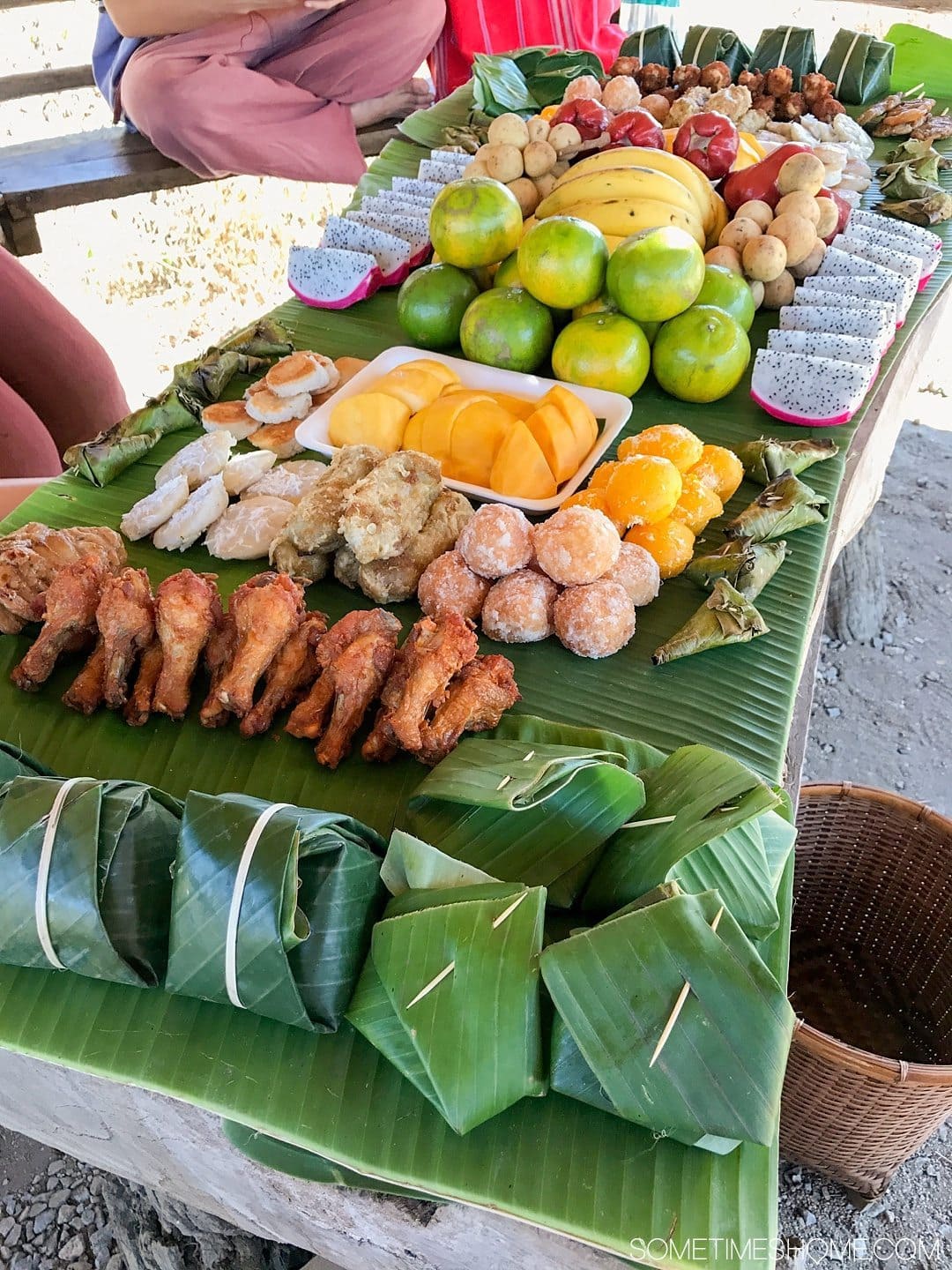
Do They Educate You About Elephants?
Yes! I learned more than I've ever known about them including:
- Teary eyes are healthy eyes. They're not crying they're just healthy!
They put dirt on their backs to keep cool.
Unhealthy elephant poop is black and smells. Healthy is a yellowish color and is odorless.
- They sweat through their toenail cuticles.
Babies nurse for four years.
Elephants live to be about 80-90 years old. Their gestation period is two years and females stop getting pregnant around 40 years old.
They get dirty from sleeping. They usually sleep for 45 minutes on one side then and 45 minutes on the other.
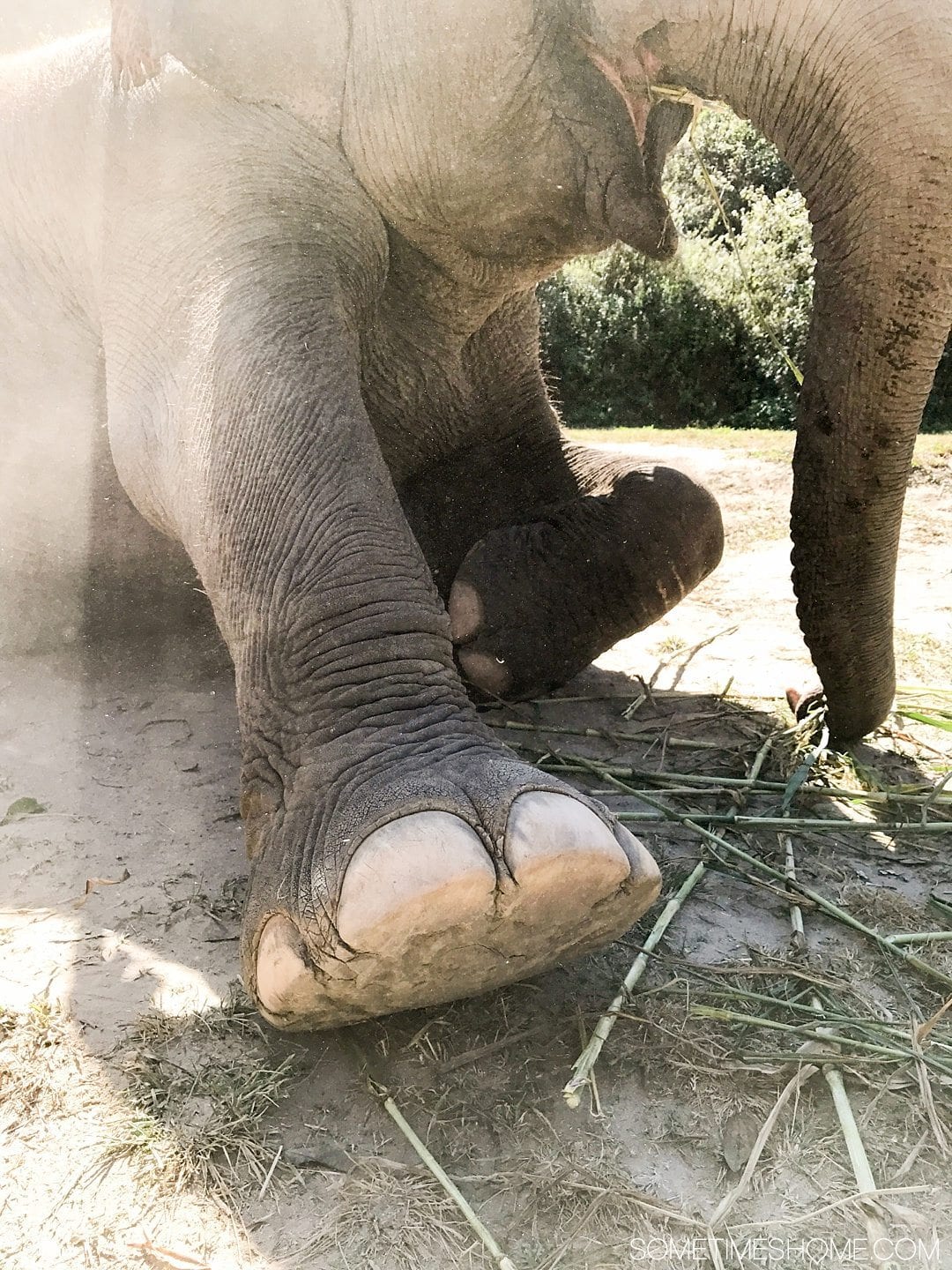
Other Important Information about Our Elephant Farm Visit:
- Leave your passport in a safe place, perhaps locked in your hotel room. There's no need to bring it with you.
Charge your camera and phone batteries the night before. If for some reason your battery life runs out don't worry – they take a lot of photos of you and the group throughout the day. (Patara staff captured all photographs in this post without a watermark.)
If you're anything like me you don't have a CD or disc reader on your computer. Luckily we had one at my parents house we visited on the way back to our home in the United States so we were able to view and transfer the photos online there. Their website leads me to believe you may be able to view the photos online now but if you still get a disc it's worth noting you may want to see if your hotel has a disc drive to view and transfer them to a more readily available format, like uploading them to Dropbox or Flickr.
- You leave your stuff in the van. We had a backpack with bug spray, sunscreen and our change of clothes. We left anything of true value at the hotel including jewelry and additional cash to be safe.
What Should We Pack?
- Change of clothes – you go from your outfit to swimsuit, then back into clothes
- Bathing suit
- Plastic bag to put your wet swimsuits in
- Towel(s)
- Cash (Thai bahts): per person amount plus extra for tips (extra money beyond payment and tips isn't necessary)
- Camera (up to your discretion/risk)
- Contacts eye drops/solution if needed (I slept during the car ride so it was helpful to rewet my contacts)
- Do not bring: passports, any jewelry that is valuable or not waterproof (like a watch)
How did You Feel About it at the End of the Experience?
It was a once-in-a-lifetime activity and I mostly felt our money went to a good cause to support elephants in a beneficial environment.
It'd be hard for elephants to still roam wild all over Chiang Mai or Thailand as a whole due to the development and loss of habitat going on there. This means loss of food, resources, etc.
Many wild elephants are captured by people who potentially exploit them. Aka: the wrong people. I could have done without riding the elephant a second time because it was giving me anxiety. I was continuously assured by the trainers my 120 pound body weight was not affecting the massive animal. Who knows?
But, again, hopefully our funds were helping to keep a good thing, in a good village, going and all in all it was a great experience.
Patara Elephant Farm vs. Elephant Nature Park
My feeling is that Elephant Nature Park is doing it right by not allowing their visitors to ride elephants. If I had to recommend one over the other, while personally not having gone to Elephant Nature Park but researching it after the fact, I'd recommend ENP.
This is truly because you can't ride elephants at ENP. And having gotten on elephants at Patara, I now wouldn't recommend it. My gut said it wasn't a good thing for them and your gut is rarely wrong.
For other amazing things in Thailand check out:
- The Best Excursion We Did in Phuket and Railay Beach Thailand
- Bangkok Night Tuk Tuk Tour You Have to Take
- The Most Romantic Restaurant in Phuket
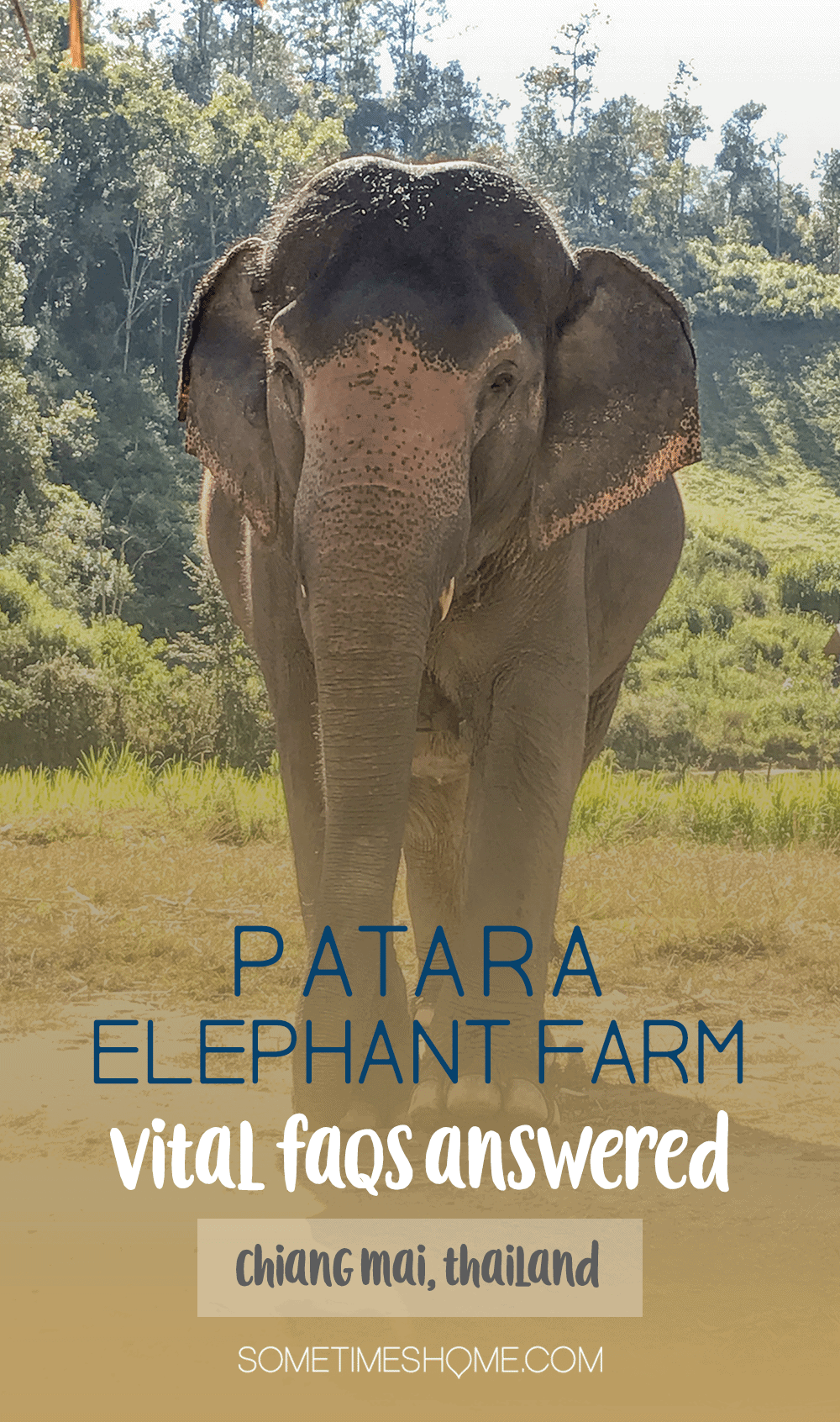


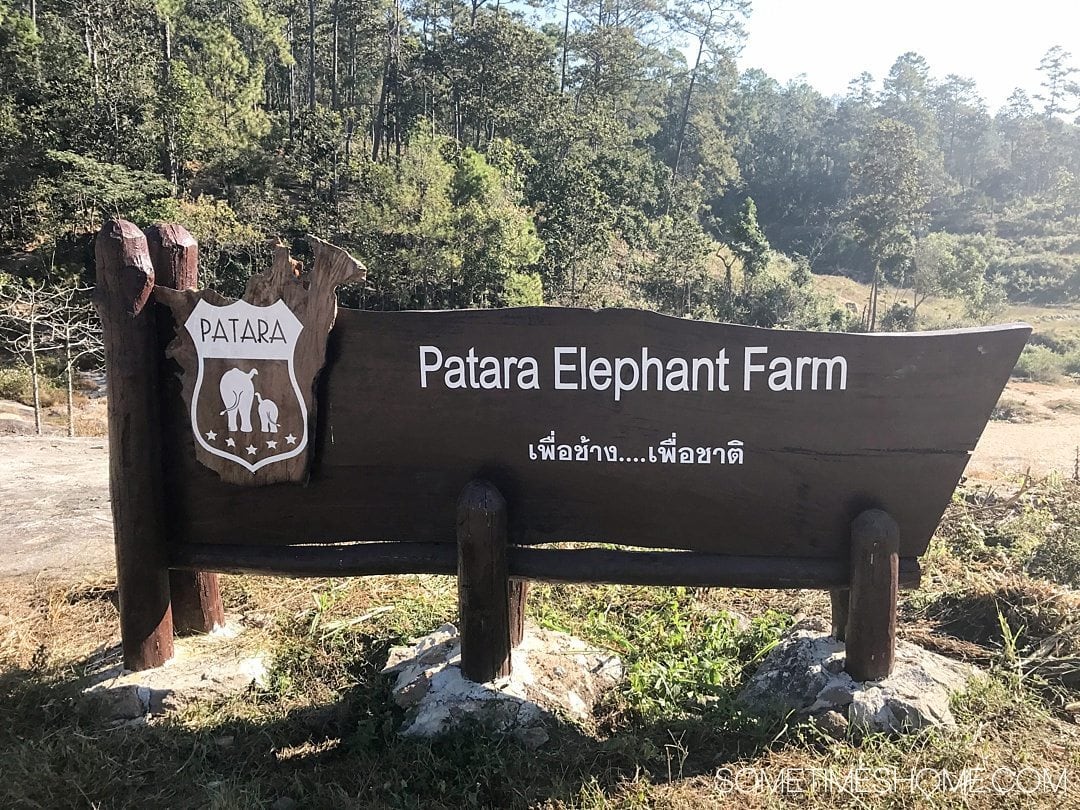
What a comprehensive and beautifully conscious article! So happy to hear all the ways they care for the elephants ? Thank you for sharing!
You’re most welcome. Thank you for reading!
This looks like an amazing experience and the elephants look very well treated. I bet it was a day you will never forget!
It was truly unforgettable! Thank you for your thoughtful comment. <3
Elephants sweat through he cuticles on their toenails. My word. I appreciate that is probably not what I am supposed to take away from this article but…. Cool.
I love that that’s what spoke to you! It is cool, right?!
I have serious doubts about any type of elephant camps but this sounds like one that doesn’t exploit them. Thanks for testing it out & sharing the experience, great to know there are good ones out there!
Completely agree! It was nice to feel like part of the solution not the problem. 🙂
I’m concerned that elephant riding seems to be condoned by the park (and you) in this article – there really is no ‘ethical’ way to do this. And whilst their elephants may otherwise be well treated, by perpetuating the myth that elephant riding is acceptable means that others will continue to do it. I worry that in order to satisfy tourists selfish needs to get that selfie atop an elephant mean that the elephants born into this sanctuary will have to be ‘broken’ as horrendously as those that they claim to have rescued.
Hi Emily! Thanks for your thoughtful comment. I see your points but I do believe these places do more good than harm for elephants that are losing their natural habitats due to outside forces (like development and such) so unfortunately I just think it’s the best option of some more evils at play.